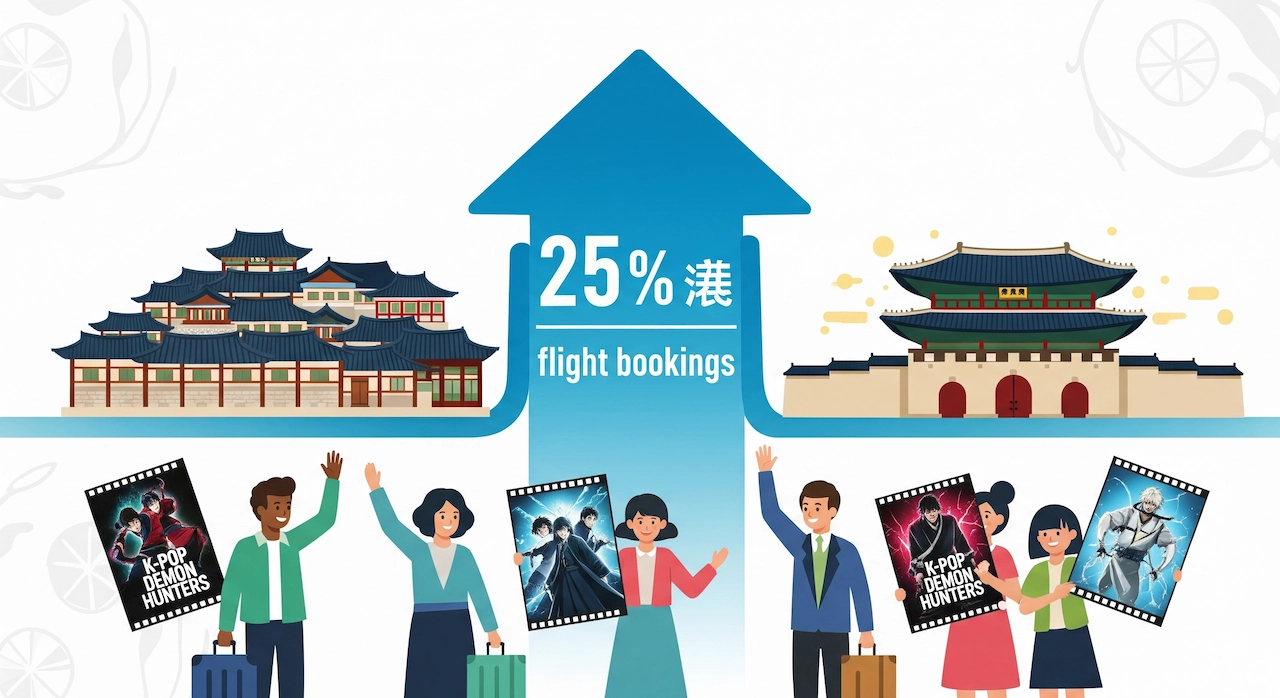GloNews10

The world has seen K-pop dominate charts, break streaming records, and redefine global pop culture. But now, this cultural phenomenon is expanding beyond music and screen, directly impacting tourism. The recent release of the Netflix animated film K-Pop “Demon Hunters” has not only captured audiences with its vibrant storytelling but also sparked a remarkable surge in international travel to South Korea. What once started as catchy melodies and synchronized dance has now become an economic force reshaping travel patterns worldwide.
Released on June 20, 2025, K-Pop “Demon Hunters” immediately became a global streaming sensation. But beyond its entertainment value, the movie created a tangible ripple in tourism. According to data from Trip.com, international flight bookings to South Korea rose 25% year-on-year after the film’s release, while month-on-month bookings grew by 11%. This wasn’t a temporary spike—numbers have continued to grow, proving the film’s impact goes beyond fandom into real-world economic behavior.
The Seoul city government reported an impressive 1.36 million foreign visitors in July 2025 alone, many explicitly citing the movie as their reason for traveling. Fans aren’t just consuming K-pop—they’re packing their bags and flying across continents to experience its cultural backdrop.
The travel boom sparked by K-Pop “Demon Hunters” has shown remarkable diversity in its audience.
This shows that K-pop’s influence isn’t regional anymore—it’s a universal cultural export with tourism acting as its newest stage.
One of the biggest outcomes of this travel boom is the renewed interest in Korean cultural heritage. K-Pop “Demon Hunters” cleverly integrates traditional backdrops with fantasy storytelling, and these visuals are now translating into must-visit destinations.

Fans are no longer satisfied with just concerts—they want to walk the streets, eat the food, and explore the culture that shapes the stories they love.
Interestingly, it’s not only Korea’s landmarks that are drawing attention. Many fans are looking for interactive, hands-on experiences that let them live out elements of K-Pop “Demon Hunters.”
This is a profound shift: travel isn’t just about sightseeing anymore—it’s about story-driven cultural participation.
The success of K-Pop “Demon Hunters” in driving tourism is not an isolated event. It is part of a larger global trend where media franchises influence real-world behavior. From “Game of Thrones” boosting visits to Croatia to “Emily in Paris” fueling Parisian tourism, entertainment now plays a major role in shaping destination demand.
But what makes K-Pop “Demon Hunters” different is its fusion of music, animation, and Korean tradition. It appeals to fans of K-pop, anime, and cultural tourism all at once, creating a broader appeal than a typical film or series. As News.com.au reported, the movie’s franchise expansion is set to cement this influence even further, with sequels, merchandise, and concerts reinforcing the fan-travel pipeline.
The numbers surrounding this travel boom are staggering. According to a tourism industry analysis, K-content-driven travel could push South Korea’s annual arrivals to 20.9 million in 2025, generating nearly 29.4 trillion won (~$20 billion) in economic activity.
For South Korea, this isn’t just a cultural win—it’s an economic strategy. Tourism authorities are now designing K-content themed packages that include film site tours, K-pop concert tickets, and cultural workshops. Airlines and hotels are also jumping on the trend, offering Demon Hunters-inspired promotions to attract younger travelers.
As highlighted by Sayart.net, this boom could reshape South Korea’s tourism industry for years to come, proving that entertainment exports are as powerful as traditional trade.
While the boom is mostly positive, it also brings challenges:
The key will be to channel this newfound interest into sustainable, respectful tourism that benefits both visitors and locals.
The case of K-Pop “Demon Hunters” proves that K-content is no longer confined to screens. It is a cultural economy engine driving tourism, hospitality, and international perception. With sequels and spin-offs already in development, South Korea’s role as a cultural tourism powerhouse is only set to grow.
What started as catchy tunes and addictive choreography has evolved into a national branding machine. South Korea is now exporting not just entertainment, but experiences—and fans worldwide are eager to consume them in real life.
K-Pop “Demon Hunters” is more than a hit film—it is a travel revolution. By blending fantasy storytelling with authentic Korean culture, it has inspired millions of fans to transform their digital admiration into physical journeys. From palaces and villages to kimchi classes and hanbok rentals, South Korea has become a living stage for global fans.
This wave shows us the power of media in shaping human behavior and highlights how entertainment can turn into an economic powerhouse. As the K-pop era enters this new phase, one thing is certain: the world isn’t just listening to K-pop anymore—they’re traveling for it.